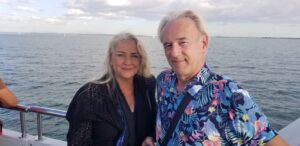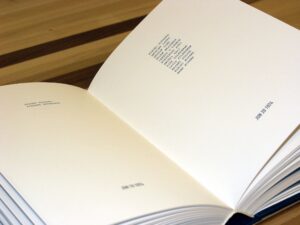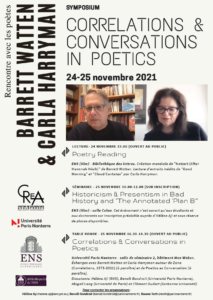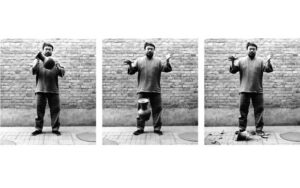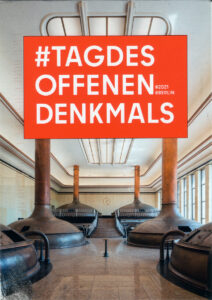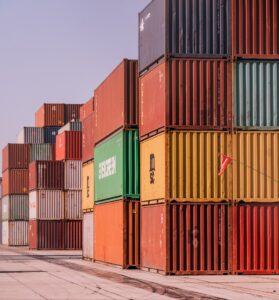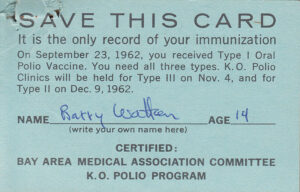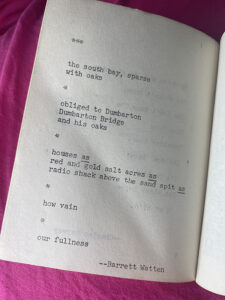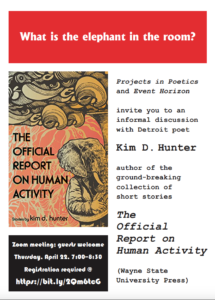I first got to know Claudia Franken through academic channels; she is a Europe-based scholar of Gertrude Stein and Arno Schmidt, a less-well-known prose writer who anticipates American postmoderns such as Thomas Pynchon. As his Wikipedia entry states, “Arno Schmidt (1914–79) was a German author and translator. He is little known outside of German-speaking areas, in part because his works present a formidable challenge to translators.” Claudia’s proposal for a session on “Avant-Gardes @ Zero Hour” took up Schmidt’s early “trilogy” of novellas focusing on cultural displacement after 1945, pursued by analogies to Egyptian and Phoenician antiquity—as if the two time frames were disturbingly (felicitously) co-present (see John E. Woods’s unequaled translation). The conference itself was canceled due to COVID but was revived as a webinar in March 2021, where Claudia presented her work on Schmidt—in a form, on first hearing, that was as allegorically complex as Schmidt’s work itself. I then engaged Claudia’s essay editorially, working toward publication in the Hunan, China-based Journal of Foreign Languages and Cultures, where it appears (here). All this is complicated, but is what it takes to get the work done in this era of travel restrictions and ideological blockage. What resulted is a fine literary essay that the editors selected to inaugurate their issue. … More
December 18, 2021
Event 90: I Met (en España)
December 8, 2021
Event 89: I Met (Metropole)
I return here to the series of “I Met” posts, begun in January 2010 after the work of On Kawara. In a series of journal entries, On Kawara documented his life in art as identical to the names, location, and dates of his dealers, contacts, and friends, giving no further interpretation. Thus he interpreted his life as identical to his art, and his art as identical to its names, locations, and dates. This project is unique, and must be so, in its radicality; it is an essay on meaning as a “restricted code” that is at the same time a subtext of the public exhibition of his iconic works and the private circulation of artistic property (as I found when permission to reproduce one of his date paintings for Questions of Poetics was denied). In my entries, the purely conceptual project undergoes mutation to the forms of life and art I inhabit while still focusing on the intersection of names, locations, dates. At one point, the series achieved a kind of “feedback” state, as when people I met at conferences or readings would ask if there going to be an “I Met” for the event; alternately, for more than two years this form of work has been nearly impossible.
Wednesday, October 6
Delta DTW > LGA
Carla Harryman
Lisa Yuskavage @ David Zwirner
Jesse Murry @ David Zwirner
Alice Neel @ David Zwirner
Frank Moore @ David Zwirner
Tyler Mitchell @ Jack Shainman
John Currin @ Gagosian
Philip Guston @ Hauser & Wirth
Robert Rauschenberg @ Pace
Robert Longo @ Pace
Jeanne Liotta @ Microscope Gallery
Michael Gottlieb & Josef Kaplan
@ St. Mark’s Church
James Sherry
Lee Ann Brown
Tony Torn
Brenda Coultas
Drew Gardner
Kyle Dacuyan … More
November 16, 2021
Event 88: Correlations & Conversations
Barrett Watten & Carla Harryman
Correlations & Conversations in Poetics
24–25 November 2021
[NOTE CORRECTED SEMINAR START TIME!]
- Poetry Reading / 24 November 19:00 / open to the public / notice of attendance requested / contact Hélène Aji (below)
Ecole normal supérieure (rue d’Ulm) / Bibliothèque des lettersWorld premiere of “Notzeit (After Hannah Höch)” / Barrett Watten
Reading from “Good Morning” and “Cloud Cantatas” / Carla Harryman
- Seminar / 25 November 9:00–10:00 / by registration
[NOTE CORRECTED SEMINAR START TIME!]
ENS (rue d’Ulm) / salle Celan / open to students and doctoral students on prior registration / contact Hélène Aji (below)“Historicism and Presentism in Bad History and ‘The Annotated Plan B'”
- Roundtable / 25 November 16:30–18:30 / open to the public / notice of attendance recommended / contact Hélène Aji (below)
Université Paris Nanterre / salle de séminaire / 2 Max Weber“Correlations & Conversations in Poetics”
Exchanges with Barrett Watten on Zone (Correlations, 1973–2021) and Carla Harryman on Poetics of Conversation
Discussants: Hélène Aji (ENS); Benoît Bondroit (U Paris Nanterre); Abigail Lang (U Paris); and Clément Oudart (Sorbonne U)Policies, media, and contact
Due to COVID precautions in Paris institutions, attendance at events at ENS is limited to 30 (reading) and 35 (seminar). Please contact Hélène Aji to place yourself on the list for the reading or to register for the seminar (students and graduate students). Attendance for the roundtable at Paris Nanterre is limited 25; contact Hélène Aji to guarantee your place.
Present plans are to make high-quality videos of the reading and roundtable, to be edited and uploaded in the near future; interviews with Barrett and Carla will be made by the ENS library and uploaded to YouTube.
Hélène Aji helene.aji@ens.psi.eu
Benoît Bondroit benoit.bondroit@parisnanterre.fr
Naomi Toth ntoth.parisnanterre.fr
Barrett Watten barrett.watten@gmail.com
October 2, 2021
Document 94: Diasporic Avant-Gardes
CALL FOR PAPERS
Diasporic Avant-Gardes:
East Asian Transitions in Form and Genre
American Comparative Literature Association
National Taiwan Normal University, Taipei
15–18 June 2022
Barrett Watten, English, Wayne State University
Lauri Scheyer, British and American Poetry
Research Center, Hunan Normal University
This seminar continues the work of Diasporic Avant-Gardes: Experimental Poetics and Cultural Displacement (ed. Barrett Watten and Carrie Noland; Palgrave, 2009)—a collection of essays addressing the intersection of diasporic literatures and the European avant-garde, with examples from African, Maghrebi, Jewish, and Hispanic diasporas. A decade later, much new work has appeared on innovative forms and genres of poetry, prose, visual art, and media reflecting the diasporic experience of East Asians over two centuries of global migration. On the one hand, the emergence of self-described avant-garde movements that engage and depart from the Euro-American model, particularly in Japan and China but at differing moments in the 50s/60s and 80s/present, has been recognized in major exhibitions. Global figures such as Yoko Ono, Yayoi Kusama, Ai Wei-wei, Cai Guo-qiang, and Huang Yongping critically address issues of material form, cultural translation, commodification, economic dispossession, and global migration. The work of experimental East Asian poets such as Kim Hyesoon, Ito Hiromi, and Hsia Yu opens the way toward a developing canon of women authors in translation and has led to critical reflection on translation itself. Asian American poets with differing histories of emigration have developed a range of innovative forms, from authors such as John Yau, Mei-mei Berssenbrugge, Pamela Lu, and Tan Lin to Don Mee Choi, Sawako Nakayusa, Mary-Kim Arnold, and Ocean Vuong. New prose genres have appeared after the examples of Maxine Hong Kingston and Yoko Tawada in innovative fictions by Tao Lin, Eugene Lim, and Karen An-hwei Lee. The reception of Asian American visual artists from Nam June Paik, Theresa Hak Kyung Cha, and Tehching Hsieh to the current exhibition of Hung Liu points toward the global transition of strictly Eurocentric theories of the avant-garde. This seminar seeks papers that explore individual artists and movements; reflects on their innovations of form and genre; and theorizes experiences of cultural distinctiveness in terms of migration, displacement, cultural heritage, appropriation, linguistic and stylistic hybridity, radical iconoclasm, and syncretic identity—seen in a productive dialogue with or a decisive reconceptualization of Euro-American avant-garde movements.
Submit proposals to ACLA by Sunday, October 31 here
For PDF flyer, click here; for online seminar page, here
Contact barrett.watten@gmail.com for more information
N.B. “In view of the ongoing pandemic, the 2022 conference may need to be moved online again. The board has developed a contingency plan and will make a final decision in January 2022″—ACLA.
Notes
Ai Wei-wei, Dropping a Han Dynasty Urn, 1995
September 26, 2021
Entry 44: Global Archives
About this time, on an every-other-year basis, I would be traveling to Berlin to further investigate the “Tag des offenen Denkmals”—the Day of Open Monuments (2021 program here). I see this event as a “global archive“—one of many I am engaged with, as also the documenta exhibitions in Germany since 1955, which I have written and just published on:
In defining “the global archive,” this essay refers, first of all, to the historical development of exhibitions in Germany that address a global horizon, a distinct cultural project since at least the Enlightenment. After 1945, modern art, which had been removed from public view by the Nazi state, was reintroduced as a project of reeducation as much as aesthetics. Documenta, beginning in 1955, exhibited modern and later artists in the destroyed buildings of the city of Kassel, and expanded its formal and cultural address to a global scale over its fifty-year history. Documenta itself became a kind of continuous archive of its own exhibition history, a mode of formal presentation that increasingly relied on the works it presented. Here I read in detail the archival strategies and form of dOCUMENTA 13, arguably a highpoint of this effort to archive globality as it emerges. “The Global Archive and the Future of Poetics,” Journal of Foreign Languages and Cultures 5, no. 1 (June 2021): 94–108 [pdf here].
September 24, 2021
Document 93: Global Ideation
The global circulation of ideas advances with the publication of the Journal of Foreign Languages and Cultures, vol. 5, no. 1, edited by Laurie Scheyer from Hunan Normal University. As with last year’s special forum on “Modernity @ Zero Hour,” this issue contains a set of papers—distributed through a capacious issue with numerous related themes—that developed in an online webinar, “Avant-Gardes @ Zero Hour,” which took place during conditions of COVID in March 2021. The webinar itself, thanks to Zoom, was itself global and involved participants from seven time zones, from New Zealand to Moscow. It also could include a performance event, the in-time screening of Carla Harryman’s “Occupying Theodor W. Adorno’s Music and New Music: A Re-Performance,” originally proposed for the canceled EAM conference in Fall 2020. In this best of all possible worlds, our proposed event went forward; papers were presented, comments generated, drafts revised, and the results are now distributed to the world at large. Below I list the contents and link to the six papers that were the result of that effort, seen as part of a larger conversation in a global framework. Indeed my own contribution, “The Global Archive and the Future of Poetics,” looks at the form of the global exhibition after the German documenta, but it easily applies to what we are doing here. … More
August 21, 2021
Archive 14: World Autobiography
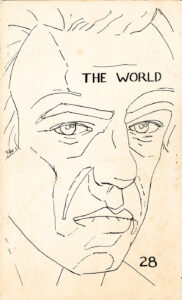 I return to the vexed question of autobiography, which in earlier times I believed one should “start writing” only when all other options—of world transformation, for instance—had failed. The two key terms are brought together in the 1973 cover of The World 28, the “Autobiography Issue” edited by Lewis Warsh. As I recalled when Lewis died late last year, I first met him in Mendocino, on his way down the coast to Bolinas, where I visited him before he moved back east. In his editing of The World, he wanted to radicalize autobiography not as a genre but as a mode of writing. Writing from an immediate perspective of “personhood” in any genre was of interest, from poetry to fiction to memoir, journal entries, letters, portraits, and snapshots.
I return to the vexed question of autobiography, which in earlier times I believed one should “start writing” only when all other options—of world transformation, for instance—had failed. The two key terms are brought together in the 1973 cover of The World 28, the “Autobiography Issue” edited by Lewis Warsh. As I recalled when Lewis died late last year, I first met him in Mendocino, on his way down the coast to Bolinas, where I visited him before he moved back east. In his editing of The World, he wanted to radicalize autobiography not as a genre but as a mode of writing. Writing from an immediate perspective of “personhood” in any genre was of interest, from poetry to fiction to memoir, journal entries, letters, portraits, and snapshots.
Autobiography would be the royal road to writing per se; there was a tradition and consensus that “self/life/writing” was what there was to do, in fact was all that could be done. For a brief while there was in fact a kind of period style of autobiographical self-discovery, nothing like the persona poems of the workshop but evoking a tradition from Rousseau and the romantics, Zukofsky’s “the words are my life,” Beat spontaneity, and New York School everyday life. The consensus—and it was not long lived—was that “into the company of self it all returns,” one might say. Warsh’s 1973 project, bringing together writers of several diverse schools, was the highpoint of that moment.
I was the early Language writer in that group, in company with Clark Coolidge, Bernadette Mayer, Tom Raworth, Bobbie Louise Hawkins, Bill Berkson, Anne Waldman, all poets who would appear in the first issues of This, but also Diane Di Prima, Kenward Elmslie, Lee Harwood, Harris Schiff, and John Wieners. The issue should be reprinted in its entirety, to reflect on the question of writing that Lewis proposed: where the fact of writing and the events of life are seen as nearly identical. What historical circumstances obtained for that to be possible, desirable, likely? But there is also a moment of transition here: from person to language—at one pole the iconic representation of personhood, in condensed and presentable form, and on the other the endlessness of scribbling in letters and journals, a fascination of writing per se. … More
August 15, 2021
Archive 13: Vaccination Records
This shouldn’t be so difficult. My archive contains my vaccination records. Since being vaccinated for a disease like polio in a pandemic is a matter of public concern, I post them here as a matter of interest. The series of three from 1962 to 1963 I would have received in the 10th grade; as the card indicates, I was 14 at the time. They were probably given at the U.S. Naval Hospital in Oakland, given my father’s signature on the card.
June 26, 2021
Archive 12: Micropoetics
Thanks to the online research of C.V. Henriette, I now have a visual record of my second appearance in a literary magazine, Gum 2, ed. Dave Morice (Iowa City, September 1971). Morice’s goal as editor was to be small and sustainable—in both aesthetic and material terms—a reflection on the political economy of poetry at the time and a counter-cultural alternative. A protominimalism, at the intersection of concrete poetry, midwestern imagism, the New York school, and the not-yet-named Language school (as well as a first instance of “actualism,” the movement that was not one) was the result. The poem was written, likely, at Berkeley under the influence of Robert Grenier, and I gave a copy to Dave after I met him in Iowa City. No title, no capitalization, no regular stanzas, no persona, no narrative, but with the use of asterisks in the mode of Ted Berrigan, Anne Waldman, and later Anselm Hollo.
“obliged to Dumbarton / Dumbarton Bridge / and his oaks” is a triangular pun on the Dumbarton Bridge, a relic of the times and one of the most ungainly bridges ever, crossing the southern San Francisco Bay, and Dumbarton Oaks, the site of the Dumbarton Oaks Conference, the progenitor of the United Nations. Also, there are many oaks in the South Bay, as the poem notes.
In the late summer and early fall of 1944, at the height of the Second World War, a series of important diplomatic meetings took place at Dumbarton Oaks, officially known as the Washington Conversations on International Peace and Security Organization. Delegations from China, the Soviet Union, the United Kingdom, and the United States deliberated over proposals for the establishment of an organization to maintain peace and security in the world. Their meetings resulted in the United Nations Charter that was adopted in San Francisco in 1945. [Wikipedia]
April 21, 2021
Document 92: Event Horizon
Kim D. Hunter
The Official Report
on Human Activity
Zoom discussion
Thursday, April 22
7:00–8:30 P.M. EDT
Projects in Poetics and Event Horizon announce an informal discussion with Detroit poet kim d. hunter, author of the ground-breaking collection of short stories from Wayne State University Press. Guests are welcome; register here: https://bit.ly/2Qm6tcG.
The Official Report on Human Activity, which is neither official nor a report, is a collection of long stories that are linked by reoccurring characters and their personal struggles in societies rife with bigotry, in which media technology and capitalism have run amok. These stories approach the holy trinity of gender, race, and class at a slant. They are concerned with the process and role of writing intertwined with the roles of music and sound. … More
